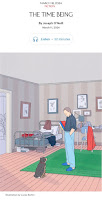Our unnamed protagonist and narrator, a young man who made a ton of money and is seeking the 'meaning of life'. He is then entangled with an older man, his white European neighbor, V.. This is 'The Time Being' by Joseph O'Neill published in The New Yorker on March 18, 2024.
It's nothing like what you would imagine. It's about neighborliness, ageing, illness and helping a neighbor in this time of unkindness. V. collapsed in his home and was sent to the hospital, where he eventually passed. Protagonist and narrator is the neighbor, and in the meantime, helped to care for V.'s dog named Pal.
In my early thirties, I began to cultivate the friendship of older people—people born twenty or thirty or even fifty years before me. I read many novels in those days. My new friends contained the experiences of life in the way that novels did, with chapters involving marriages, careers, wars, intergenerational dramas, travels, dénouements, deaths. Their biographical force field was strong. They embodied the theme of time. Time was thematic. It was not yet a source of ever-worsening personal harm.
The narrator is fascinated by V.'s life, and his eastern European heritage. He didn't even mind retrieving books from V.'s home and then bringing them to read to him in the hospital. There's this vague thing about history and survivor, but I'm not sure I want to think about it. It's not strong enough. In a response to an interview question about survivors, the author said,
As older people sometimes do, Mr. V. collapses. He’s sent to the hospital; he’ll never go home. The narrator gradually assumes the responsibility of his care, and of his dog. Late in the story, almost imperceptibly, the narrator himself ends up in the hospital. Is the narrator now a survivor and a subject of history? What separates him from Mr. V., in this respect?
I’m not sure that much separates them. Time seems to have caught up with the protagonist as it did for Mr. V.—forced him to migrate from the world of the well to the world of the unwell. In this respect, he is a subject of history in the broadest sense, and certainly in the sense of facing the limits of his autonomy. He has become, against his will, rich in experience.
V. eventually passed away, and his son-in-law came to clear out the apartment. The narrator judged the son-in-law for his 'Floridian' roots — "He was, like so many Floridians, a person of low character, a person who cared for nothing outside himself. That was obvious. He was not an émigré—he was an American, the real deal." This son-in-law refused to tell the narrator anything about V. daughter and grandson. To the narrator, the son-in-law is completely useless since he didn't give up an iota of informmation or fun facts.
Anyway, Pal the dog who is a half Entlebucher, stayed on with the narrator. I cackled so loudly at the ending of the little story. Okay, to each his own when trying to understand the 'meaning of life'.
Harlene truly was the intellectual of my suspicions, although she originated not from Warsaw or Lublin or Salonika but from Omaha. She was exactly what I was looking for: a clever, wise, learned, and experienced person, an actual professor who was prepared to converse about the profoundest questions. At the time, I thought it was because she found me a worthy collaborator in thought. I now suspect that she dropped by because she was entranced by my kitchen appliances, which included a dishwasher manufactured to my specifications, a built-in forty-eight-inch refrigerator, a large wine cooler dedicated to champagne and cava, and an antique range cooker imported from Sweden. That was how I then rolled.
Harlene introduced me to a concept of her own invention: the Robinson fallacy.
“What is the Robinson fallacy?” I asked. In those days, fallacies fascinated me.
It referred, she said, to the mistaken sense that one has been marooned, that the sails of rescuers will one day appear on the horizon, that one is on the island only for the time being.
“I don’t fully understand,” I confessed.
Harlene drained her glass of champagne and rose to her feet. She replied, in a voice full of forlornness—it was pretty much the last thing she said to me, because Pal and I quit the building soon afterward—“Your refrigerator is so beautiful I could move into it.”
This is the kind of obfuscation that I will avoid when I write to my nephew to explain to him the meaning of life.

No comments:
Post a Comment